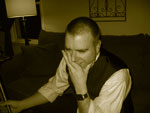Sixteen (or so) Candles
Michael Dean Clark
 Since this blog will publish on my birthday, I decided to make some wishes with it. Yes, I am aware that wishes made public supposedly won't come true. And yet, wishes kept captive in the inner-recesses of my addled mind go nowhere anyway, so I feel safe in putting a few out there. And yes, I am also aware that making my wish list public might be taken as a tad self-serving. That's because it is. And I'm ok with that.
Since this blog will publish on my birthday, I decided to make some wishes with it. Yes, I am aware that wishes made public supposedly won't come true. And yet, wishes kept captive in the inner-recesses of my addled mind go nowhere anyway, so I feel safe in putting a few out there. And yes, I am also aware that making my wish list public might be taken as a tad self-serving. That's because it is. And I'm ok with that.
Wish #1 This year, my 38th if you must know, I really hope to be found by a story that makes me feel so inferior I am compelled to write it. This is not because I have an inflated opinion of myself and my abilities. Rather, I want desperately to be stunned into the process of telling an amazing story that, for some reason or other, has not been told. I am convinced that it is not an artistic duty that drives story as much as it is the incumbent need to bear witness to the invisible.
Wish #2 Re: Wish #1 - Because so many stories worth telling get ignored for ones we've heard too many times before, my second wish is that anyone who ends up reading this blog will also be confronted with a story they must tell. If it happens, I'm hoping the candle I blew out with your name on it compels you to find the keyboard rather than think "Someone should really write about that."
Wish #3 Re: Wish #1&2 - Because the desire to write a story is the response we SHOULD automatically heed, my third wish is that all of us who commit these stories to prose actually seek their publication so we are not the only ones who get the opportunity to experience them. Instead, I wish for all of these stories to eventually be submitted to various publications (and no, this is not me shoe-horning in two wishes, Jafar). If you're not sure where to send the story you write, spend some time here.
Wish #4 And for my final wish, a little selfishness on my part (as if taking one more wish than the customary three is not selfish enough). I wish that all our stories find homes, bear witness, and inspire others to stand in the path of stories that will force them, in turn, to be witnesses themselves.
So don't let me down people. It is my birthday and all.
Michael Dean Clark is the fiction editor at Relief and an assistant professor of writing at Point Loma Nazarene University in San Diego, California. When he's not writing or parenting via shame and sarcasm, Clark is waiting (im)patiently for the return of Psych, and you know that’s right.